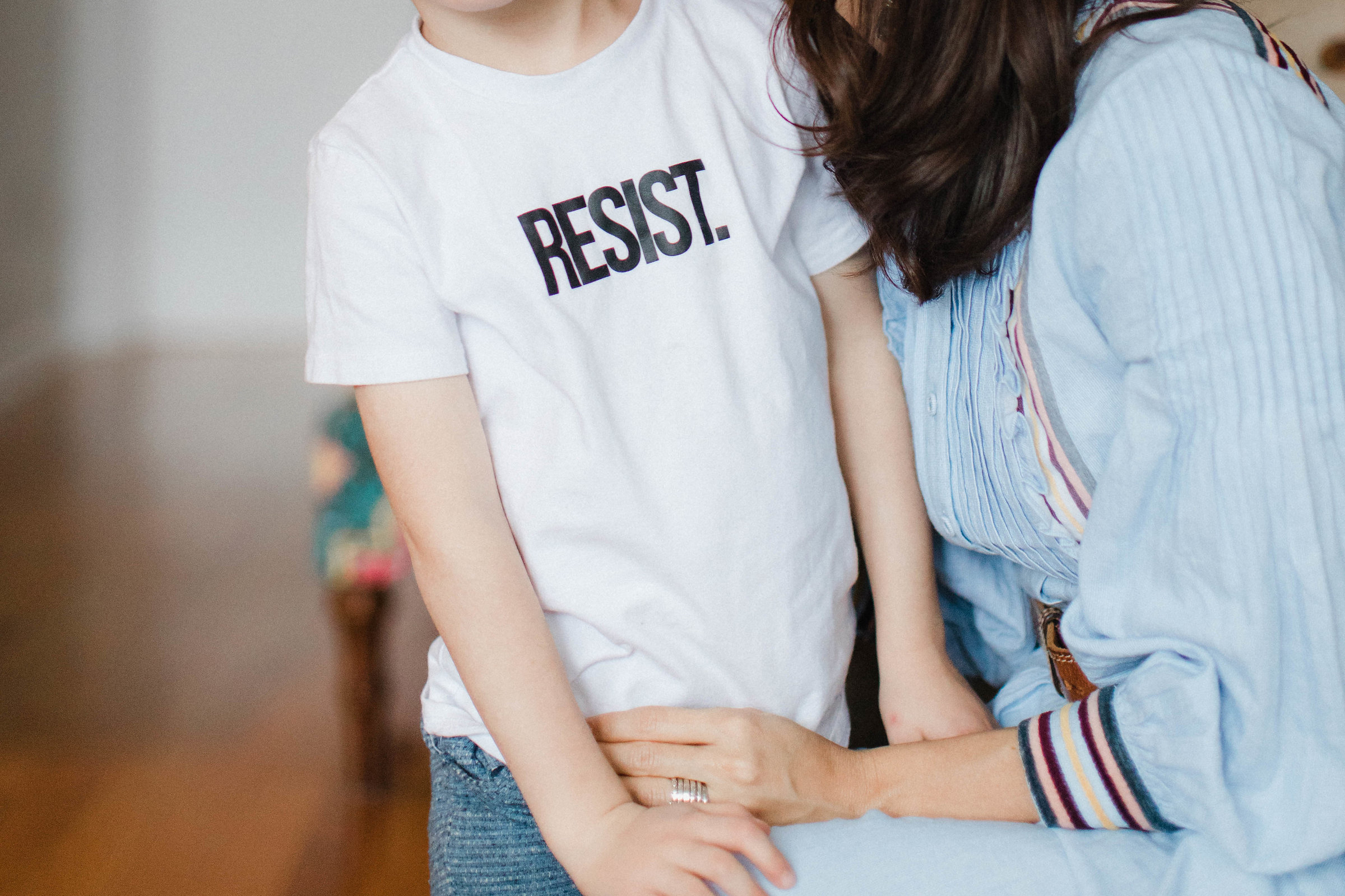
Rape Culture: What It Is & How To Combat It When Raising Kids
Written by Julia Feldman
Photography by PHOTOGRAPHED BY VICTORIA GLORIA OF MOTHERHOOD STORYBOOK
The term “rape culture” is being used in the media and across social platforms a lot lately. Though we may have thoughts about what it means, what are we actually talking about here? Roughly speaking, “rape culture” is a sociological term used to describe a culture in which sexual assault and the routine violation of female autonomy is not only permitted but woven, both subtly and overtly, into the very fabric of our society. In light of the rise of #metoo and #timesup, there’s a widespread interest in better understanding the social forces that are contributing to these horrific and routine violations. As parents of both girls and boys, this interest is multifaceted; we want to understand the forces at play, protect our children from the evils that surround us, and figure out how to raise children who will help to disrupt these horrible cycles—lest we be complacent in perpetuating them.
Let’s begin by establishing a baseline understanding: Rape isn’t about sex, it’s about power, control, and violence. Similarly, rape culture is about a system that teaches people from a very young age that they are expected to perform a predetermined role in a societal power structure that perpetuates violence and subjugation. Though no one would explicitly tell a child that their feelings don’t matter or that it’s okay to harm others for a sense of personal fulfillment, these messages are actually subtly transmitted constantly and the cumulative effect is a society in which 1 in 3 women worldwide reports experiencing some act of sexual violence in her lifetime, often before she reaches adulthood. Though the name employs the word “rape,” the violations are far more varied: the constant subtle messages girls receive about pleasing others; women and girls’ being told that their clothing invites negative attention; catcalls; sexual harassment; not “being believed”; and violations like rape and physical assaults. The term acknowledges that there is a pervasive long standing social acceptance of such behaviors, so well established that they seem routine and expected.
As parents (and non-parents), we need to break down the gender stereotypes that continue to send the dangerous message that being a “good girl” means being permissive, always pleasing others, taking a passive role, and prioritizing others’ wants and needs above one’s own. We need to stop teaching boys that masculinity is about taking control or being aggressive. We must make it absolutely clear that violence used to control and make others feel small isn’t a marker of masculinity; it’s a sign of cowardice and an individual who has deficient resources with which to communicate their anger and frustration. We must once and for all exclaim that “boys will be boys” is offensive, incorrect, and does a huge disservice to our sons by denying them the support and skills they need to respond to life’s challenges with emotionally appropriate strategies.
Below is a list of some things we can all start to do to disrupt rape culture, right now.
Combatting Gender Stereotypes:
*Give your young child a doll and a truck. Dress them in pink and blue and rainbows and sparkles. Actively work to disrupt the notion that there is something inherently prettier or more nurturing about girls or something more active, analytical, or aggressive about boys.
*Praise your child for their specific successes and effort, not for being a “good boy” or a “good girl.” Their successes are not a product of their gender, they are a product of the beautiful and unique person that they inherently are.
Boosting Emotional Intelligence:
*Don’t excuse negative behaviors because “boys will be boys” or suggest that violence, abuse, or harassment are acceptable ways for children (or adults) to express romantic or affectionate feelings.
*Actively work to develop skills around emotional intelligence, coping, and communication for all kids. Encourage your children to feel and name their emotions like sadness, fear, or disappointment without judgment.
Encouraging Body Autonomy:
*Teach your child the correct names of their body parts, that their body belongs to them, and that they control who touches it. Reinforce these messages often and encourage your child to assert when they do or don’t want to be touched, hugged, or kissed. Teach your extended family and friends to respect your child’s body autonomy.
*Teach your child to say “stop” when they are uncomfortable or don’t like the way they are being treated. Practice over and over again until it feels natural and comfortable.
Teaching Consent:
*Teach your child about consent and model it routinely for your child. Ask them before you tickle them, take off their rain boots, or change their diaper. The more you can make this direct communication an expected behavior, the more your child will believe that they deserve it and the more aware they will be when their autonomy and rights have been violated.
*Make it absolutely clear that no one ever deserves to experience violence or violation. It is never a person’s fault if they are harmed by another person.
Advocating For Others:
*Teach your child to be an ally who stands up for the rights of others and fights injustice. Create an expectation that they will support their friends and intervene on the behalf of those who need a friend or an advocate.
*Stand up to injustice when you see it. Show your child that you won’t stand for the mistreatment of others. Don’t shy away from supporting others because it makes you uncomfortable; be someone your child can be proud of.
Monitoring Media Consumption:
*Be aware of the media your child consumes. Engage in routine discussions about representation that you find offensive or problematic. Ask your child what they think and genuinely listen to their opinions. For example, why is the female character serving the male character? What exactly is that song saying about how men should treat women?
*Teach your child to critically evaluate media: Who is creating it? What is their motivation? What messages are being transmitted? What impact might those messages have on society or an individual?
*For older children, talk about pornography; it’s not real life, it should not be viewed as instructive. Adult actors are paid to perform unrealistic scenarios that have little regard for mutual pleasure, safety, respect, and often employ sexism and misogyny.
*Talk about where to find reliable information about bodies and sex. Make it clear that unlike parents, “Google doesn’t love you” nor does it have your needs or best interests at heart.
Teaching Sex Education:
*Develop the expectation that you will have ongoing, honest, supportive, and (sometimes) uncomfortable discussions about bodies, relationships, intimacy, boundaries, and communication.
*Teach your child that sex is beautiful and magical and powerful and exciting and vulnerable and not to be taken lightly. They deserve to feel respected, valued, heard, and prioritized; they also have a responsibility to make others feel the same.
*Teach your child that they deserve to feel pleasure. One of the many negative effects of rape culture that is rarely discussed is that it relegates many young women to passive roles in their developing sexuality where they feel as if their development or sexual maturation is happening to them—being defined and controlled by outside forces. Rarely are intrinsic feelings of desire or curiosity the first signs of a developing sexuality—usually it is the (unwanted and unsolicited) attention of men that causes young women to realize that their bodies and roles in society are changing.
*Because of the stigma, internalized shame, and lack of knowhow, many parents shy away from discussing sexuality with their kids. If parents challenged themselves to see their child’s developing sexual identity as natural and worthy of supporting, even at the risk of their own temporary discomfort, they would go out of their way to articulate their hopes and high expectations for their child’s intimate relationships and sense of confidence and self-esteem. Communicating high expectations goes a long way in all aspects of parenting but especially when all of the alternate messages are so plentiful and damaging.
As parents, we can’t change the world around us, but we can take significant steps to raise ethical, upstanding little people who might not accept such a flawed world. We want better for our children, boys and girls both, and equipping them with skills to better navigate our culture is worth the work!
Julia Feldman is the founder of Giving The Talk, an organization dedicated to “sex ed for this century,” the mother of a toddler boy, and the author of the recent Mother piece 16 Great Sex Ed Books For Kids, Tweens, & Teens.
For more on the topic above, check out Mother articles on Combatting Gender Stereotypes In The Media, How To Talk To Kids About Gender, Boys & Body Image: How To Promote Healthy Habits At Home, A Must-Watch Documentary For Moms Of Boys (And Girls), 18 Kids Books That Challenge Gender Norms, and Teaching Consent.
Share this story




